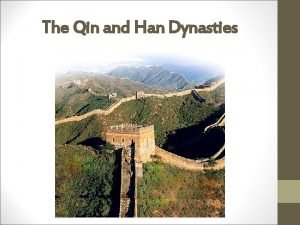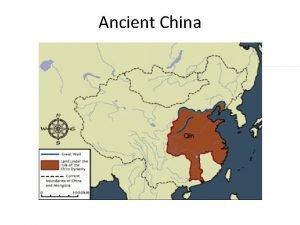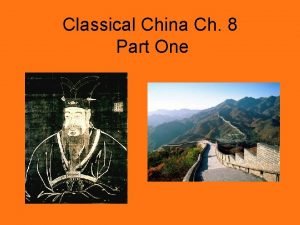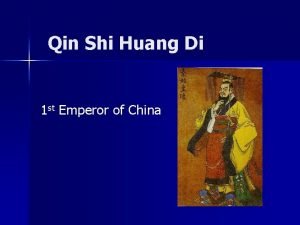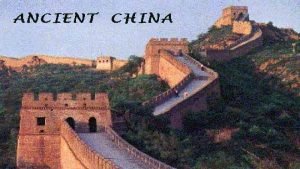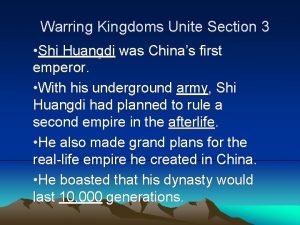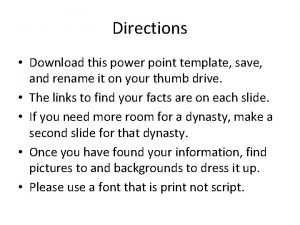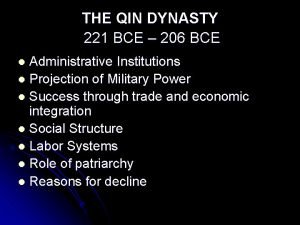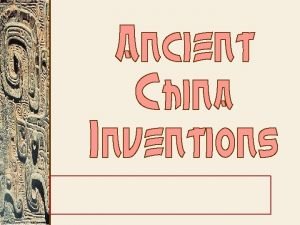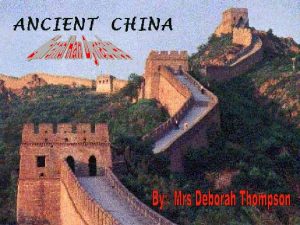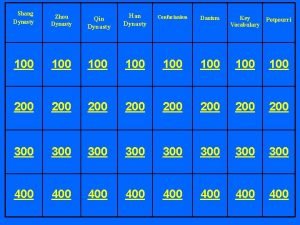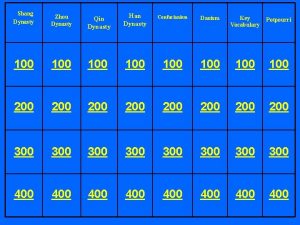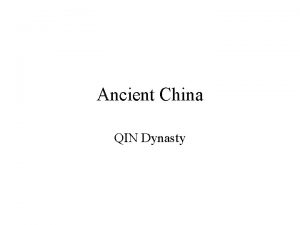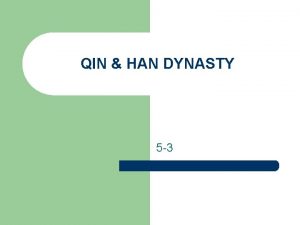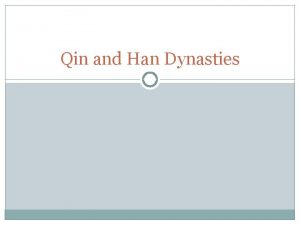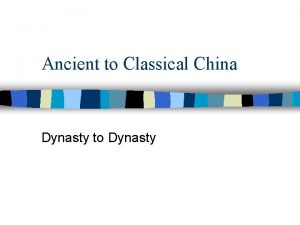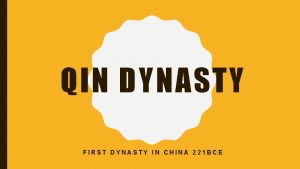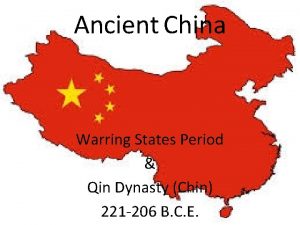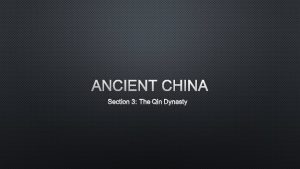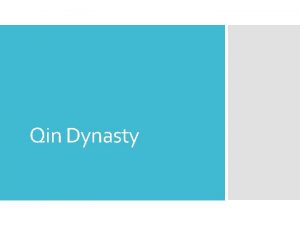Ancient China I The Qin Dynasty 402 201












- Slides: 12

Ancient China

I. The Qin Dynasty 402 – 201 B. C. E. - Era of the Warring States Nobles formed independent armies, fought over territory, forced Zhou dynasty leaders from power Qin region proved most powerful Shi Huangdi – First Emperor Unified all regions under the name China Leaders appointed by the Emperor took over for noble/aristocratic families Leaders picked from non-aristocratic families Why important?

II. Legacy of Qin Dynasty Innovations Standardized coins, weights, and measures Completely standardized written script Completed new irrigation projects Promoted manufacturing – silk cloth The Great Wall Harsh rule Burned/banned many written documents – prevent criticism/opposing ways of thinking Harsh punishments for breaking laws (see Legalism) Peasant revolts due to high taxes and oppressive tactics brought end to dynasty

III. The Han Dynasty After Emperor’s death, series of rebellions lead to new dynasty Retained the centralized gov't of Qin Dynasty Reduced oppressive laws Expanded empire – central Asia, Korea, southeastern Asia Government was improved thanks to formal training Would eventually lead to weakening of empire Creation of a bureaucracy – trained government officials Confucianism promoted throughout China

IV. Political Developments of Classical China was the largest political system in the world • • Clear evolution of political thought seen in dynasties Zhou dynasty = strong local governments/rulers – Depended on a network of noble families – Village leaders important to peasants Qin dynasty = strong unified society/government – Established a single law code – Uniform tax system

IV. Continued… • • Han dynasty = perfected the bureaucracy – Required leaders to take a civil service test – Lower class citizens could achieve increase in status Classical China established many lasting gov't traditions: – Judicial system for enforcing laws – Organized, centralized military – Scientific research – ushered in the Iron Age – Historical record keeping

V. Economy of Classical China • • Agricultural society – Rice and wheat the main commodities – Most people were peasant farmers Trade – Mostly within China, but Silk Roads would become more important over the centuries – Silk, jewelry, leather goods, furniture – Society did not hold merchants in high regard • More respect for learning and political service • Comes from teachings of Confucius

VI. Technology of Classical China • Invented/innovated many things that would be used all over the world for centuries – Harnesses that allowed animals to pull carts and wagons without choking – Ox-drawn plows for farming – Iron tools – better than bronze – Paper

VII. Belief Systems/Philosophies of Classical China • Confucius (551 -478 B. C. E. ) – Lived during the Zhou Dynasty – Promoted the studying and teaching of history and moral c haracter – Believed in social order, harmony, and good government – Five basic relationships: • • • 1. ruler and subject 2. father and son 3. husband wife 4. older brother and younger brother 5. friend and friend

VII. Continued… – – – Code of conduct regulated these relationships • Example: rulers should be kind, subjects should be loyal Stressed importance of respect for one's family Ideas about government • Taught the importance of training and educating government leaders (bureaucracy) Confucianism not a religion The foundation for Chinese government and social order

VII. Continued… • Legalism – Founded during the Qin Dynasty by politician, Shang Yang – Believed in a powerful, authoritative government – Use force, not reason/respect for others, to gain control – Good citizens rewarded well, disobedient citizens punished harshly – Education and philosophy strictly controlled by the government – Opposing views not allowed, created disharmony

VII. Continued… • Daoism (Taoism) – Loazi, founder in the sixth century B. C. E. – A spiritual alternative to Confucianism – – – Shares many similar ideas regarding harmony and relationships Natural order – relationships among all living things, not just in society A universal force (Dao) guides all things Live simply and in harmony with nature Stressed humility and frugal living
 Four chinese dynasties
Four chinese dynasties Ancient china roads
Ancient china roads Ancient china zhou dynasty
Ancient china zhou dynasty Qin dynasty gender roles
Qin dynasty gender roles Qin shi huang quotes
Qin shi huang quotes Why did the shang rulers become powerful
Why did the shang rulers become powerful Who helped overthrow the qin dynasty
Who helped overthrow the qin dynasty Zhou dynasty facts
Zhou dynasty facts Qin dynasty (221-206 b.c.e.)
Qin dynasty (221-206 b.c.e.) Qin dynasty innovations
Qin dynasty innovations Ancient india vs ancient china
Ancient india vs ancient china Qin map
Qin map China history timeline
China history timeline
